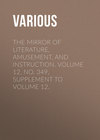Read the book: «The Mirror of Literature, Amusement, and Instruction. Volume 12, No. 349, Supplement to Volume 12.»
PREFACE
The present sheet completes the TWELFTH VOLUME OF THE MIRROR. This circumstance alone is typical of the substantial patronage which has attended our exertions from their commencement; and may be, we hope, anticipatory of continued success.
Our career of six years has been subdivided into twelve volumes or sessions; we have had no recess, but uniformly "a house;" and, as members of the republic of letters, we hope to be re-elected by our numerous constituents. To speak heroically, and as Puff says in the Critic, to "keep it up," their approbation is
the air we breathe,
If we have it not, we die.
Although we do not presume to account for our own success, or to trace its maintenance through all the fluctuations of six years—yet we are prone to believe that the economy of the plan, coupled with the spirit of curiosity which it is our aim to encourage,—have been the prime movers of our fortunes, as they have been the pivots upon which we have performed our half-yearly revolutions. In these we have allowed neither autumn nor winter to impair our exertions; and, however time may have worn otherwise with us, we still feel all the youth and freshness of spring-tide, warmed by the genial ray of public favour.
The spirit of curiosity to which we here allude, is thus admirably described by Sterne:—"The love of variety, or curiosity of seeing new things, which is the same, or at least a sister passion to it,—seems wove into the frame of every son and daughter of Adam; we usually speak of it as one of nature's levities, though planted within us for the solid purposes of carrying forwards the mind to fresh enquiry and knowledge: strip us of it, the mind (I fear) would doze for ever over the present page; and we should all of us rest at ease with such objects as present themselves in the parish or province where we first drew our breath."
Such has been our feeling from the first; and in pursuing this principle, we have been greatly encouraged by the several contributors, whose signatures abound in every Number of THE MIRROR. To these friends we beg thus briefly to return our sincere thanks.
The arrangement of the present Volume, generally, accords with those of its successful predecessors. Fact and fancy; sentiment, poetry, and popular science; anecdote and art; love of nature and knowledge of the world—alternate in its columns. In these several departments popular reading has been our study. With this view, we have paid especial attention to the domestic history—the customs, amusements, and peculiarities—of our own country; and to such a portion of foreign novelties as bear upon the welfare and interests of the present generation. Economy of time, which is also economy of money or cost, has been the ruling principle of our little literary exchequer; while our ways and means for the future are equally abundant.
The illustrative portion, also, contains many striking novelties, which, as identified with contemporary curiosity, or as performances of art, will, we are persuaded, be duly appreciated.
We abstain from further enumeration of the contents or of their respective claims to the reader's notice. In every Number it has been our endeavour to cater for his "amusement and instruction," so as to combine interest and novelty—or, in a homely phrase, to make each sheet like "the punch of conversation." Thus, we have spirit, volatile and fiery in our leading articles; lemon in our pungent Notes; sugar in our "Gatherer;" and water quant. suff.—mixed in a form, which, like old bowls or drinking-glasses, is variegated with figures and scenes of the current fashion—as in our Engravings.




















